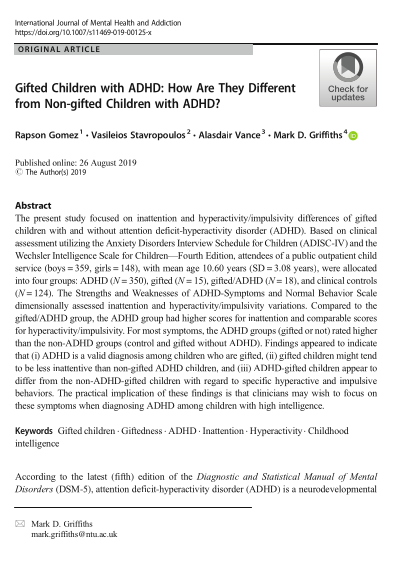The present study focused on inattention and hyperactivity/impulsivity differences of gifted children with and without attention deficit-hyperactivity disorder (ADHD). Based on clinical assessment utilizing the Anxiety Disorders Interview Schedule for Children (ADISC-IV) and the Wechsler Intelligence Scale for Children—Fourth Edition, attendees of a public outpatient child service (boys = 359, girls = 148), with mean age 10.60 years (SD = 3.08 years), were allocated into four groups: ADHD (N = 350), gifted (N = 15), gifted/ADHD (N = 18), and clinical controls (N = 124). The Strengths and Weaknesses of ADHD-Symptoms and Normal Behavior Scale dimensionally assessed inattention and hyperactivity/impulsivity variations. Compared to the gifted/ADHD group, the ADHD group had higher scores for inattention and comparable scores for hyperactivity/impulsivity. For most symptoms, the ADHD groups (gifted or not) rated higher than the non-ADHD groups (control and gifted without ADHD). Findings appeared to indicate that (i) ADHD is a valid diagnosis among children who are gifted, (ii) gifted children might tend to be less inattentive than non-gifted ADHD children, and (iii) ADHD-gifted children appear to differ from the non-ADHD-gifted children with regard to specific hyperactive and impulsive behaviors. The practical implication of these findings is that clinicians may wish to focus on these symptoms when diagnosing ADHD among children with high intelligence.
